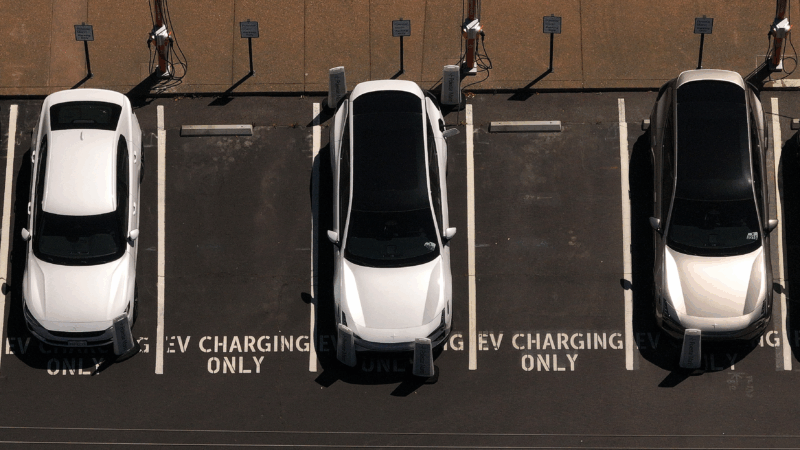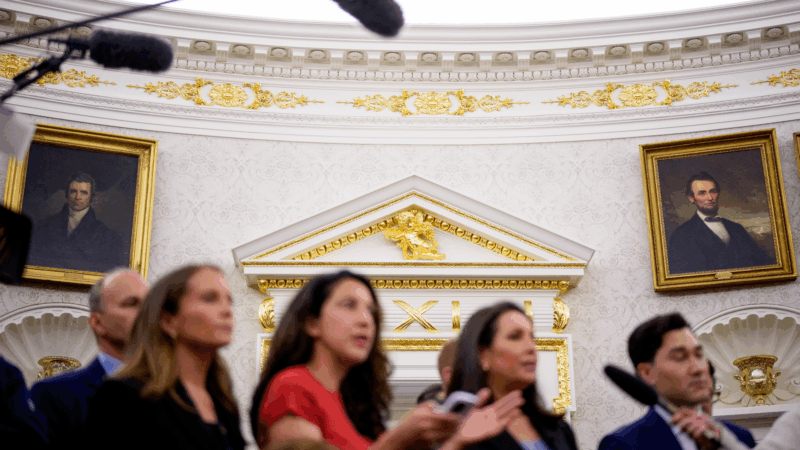A Ukrainian actress saw herself in a White House video — and created one in response
KYIV, Ukraine — A social media video promoting President Trump’s tax bill is getting a lot of attention in Ukraine. The reason involves a TV star, a mission and a powerful Ukrainian weapon — humor.
Last week, the White House posted a video on its official Instagram page, showing a woman working at a computer late at night.
“Work more, keep more,” the subtitles read. “No tax on overtime, courtesy of the one big beautiful bill.”
The post received hundreds of comments. Many were from Ukrainians. “That’s our Motrya,” they wrote.
Motrya — played by Antonina Khyzhniak, a well-known Ukrainian actress — is a character from Spiymaty Kaidasha, To Catch the Kaidash, a 2020 Ukrainian TV drama series.
Speaking with NPR by phone, Khyzhniak recalls the day in late June when her smartphone started pinging nonstop.
“I was bombarded with hundreds of messages, tags and comments, ” she says. “I did not understand what was happening and where this video came from.”
At first Khyzhniak thought it might have been made using artificial intelligence. But the interior, clothes and laptop looked so familiar. Then she remembered: she had taken part in a video shoot to generate stock footage which can be purchased and is often not copyrighted.
It wasn’t digital magic: it was part of her real life as an actress.
A celebrity in her homeland, Khyzhniak knew how to make the most of the moment. She made her own video, appearing as both herself and President Trump. Her portrayal of the U.S. president involves using an animation of his face on her body and imitating his voice.
In the video, Khyzhniak acts out an imaginary negotiation between herself and Trump.
“I need your face,” Khzhniak’s Trump says.
“I need…. 5 Patriots,” she responds.
“Deal! Yes!”
Patriots are state-of-the-art, American-made air defense systems that help protect Ukraine from Russian attacks. Now that these attacks have been escalating for months, Ukraine needs more Patriots.
Khyzhniak tells NPR that her video, though seemingly lighthearted, was an opportunity to talk about what Ukrainians are going through.
“You fall asleep and you don’t know whether you will wake up, whether you will be lucky in this lottery to survive,” she says.
On July 1, the White House announced that it is stopping some weapons shipments, including air defense missiles that have been already promised to Ukraine.
Before this decision, Khyzhniak had joked that maybe one day she could speak with Trump for real.
And — in another joke — she made clear in the video and in her NPR interview that she’d dress the part.
Many Ukrainians were shocked in February when a Trump-aligned cable news correspondent mocked Ukraine’s President Volodymyr Zelenskyy during a White House visit for not wearing business attire — even though the Ukrainian president is world-famous for wearing combat-style black, gray or khaki cargo pants and sweatshirts decorated with Ukrainian national symbols, to show he is leading a nation at war.
Khyzhniak suggested she would dress in a way to deflect any sartorial outrage, should she get a negotiations invite.
“Well, I do have a suit,” she laughed. “I’m ready to go.”
The Best Tiny Desk Concerts of 2025
Which Tiny Desk made an audio engineer question everything? Which one made a producer want to cry? Touch grass? Look back on the year in Tiny Desk, with the people who make them.
Teens are having disturbing interactions with chatbots. Here’s how to lower the risks
Teen use of AI chat bots is growing, and psychologists worry it's affecting their social development and mental health. Here's what parents should know to help kids use the technology safely.
Electric vehicles had a bumpy road in 2025 — and one pleasant surprise
A suite of pro-EV federal policies have been reversed. Well-known vehicles have been discontinued. Sales plummeted. But interest is holding steady.
A ‘very aesthetic person,’ President Trump says being a builder is his second job
President Trump was a builder before he took office, but he has continued it as a hobby in the White House.
Why do so many people ring in the new year on Jan. 1?
Much of the world follows the Gregorian calendar, named after Pope Gregory XIII, who put the finishing touches on a Roman system that integrated ideas from other cultures.
Pipe bomb suspect told FBI he targeted U.S. political parties, memo says
The man accused of placing two pipe bombs in Washington on the eve of Jan. 6, 2021 told investigators someone needed to "speak up" for people who believed the 2020 election was stolen, prosecutors said Sunday.








